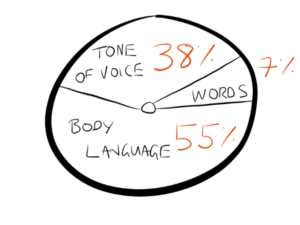The Essential Elements for an Effective Sermon
The Essential Elements for an Effective Sermon
In the last series of posts we looked at the preacher’s identity. Now I want to change the subject. We will explore this question: What are the essential elements for an effective sermon according to experts?
Is It The Words?
I have a picture in my mind as I write this post. At the end of my seminary experience I served in a church that had no pastor for a summer. This was my first opportunity to preach every week (morning and evening services) for ten straight weeks. For the first time, I chose the passages for preaching, and I worried each week about how to make the message effective So here’s the picture that sticks in my mind.
 I’m sitting in a sparsely furnished house, in the room that I designated as my “study”. I have a portable typewriter (not even electric) sitting on the table in front of me, and I am trying to find the right words to put on the paper. You see, I thought that if I could just find the right words, that would create an effective sermon. I believed that the words I chose would be one of the essential elements for an effective sermon that summer.
I’m sitting in a sparsely furnished house, in the room that I designated as my “study”. I have a portable typewriter (not even electric) sitting on the table in front of me, and I am trying to find the right words to put on the paper. You see, I thought that if I could just find the right words, that would create an effective sermon. I believed that the words I chose would be one of the essential elements for an effective sermon that summer.
Imagine my surprise some years later, when I learn the 7-38-55 rule of communication. This rule, developed by

Albert Mehrabian
a researcher named Albert Mehrabian, is reads this way:
The rule states that 7 percent of meaning is communicated through spoken word, 38 percent through tone of voice, and 55 percent through body language. It was developed by psychology professor Albert Mehrabian at the University of California, Los Angeles, who laid out the concept in his 1971 book Silent Messages (1971).
Are Words Unimportant As An Essential Element of Effective Sermons?
 It would be easy to make the conclusion that we shouldn’t pay attention as much to words. Since it is only 7% of communication, shouldn’t we spend more energy on tone and body language?
It would be easy to make the conclusion that we shouldn’t pay attention as much to words. Since it is only 7% of communication, shouldn’t we spend more energy on tone and body language?
Please don’t read that into what I am saying here. We are dealing with the “Word” of God. Jesus the “Logos” or the Word through through which God created the world. The Apostle Paul tells us that “All Scripture is inspired by God, and is profitable for teaching, for reproof and for for correcting and for training in righteousness…” (2 Timothy 3:16).
In a very early post in this blog I reflected on the fact that words have power. When the Spirit empowers the spoken words of someone, things start to happen.
The Impact of a “Word” in My Life
My initial call to ministry happened when a 6th grade teacher suggested that I consider the ministry. It was the first  day of class, and Ballast was the first name in the alphabet in our class. That meant that I got to be the first to provide some devotional thoughts before our lunch time. The teacher, Mrs. Frens, spent the morning telling us how much we were going to have to study this year. She expected one hour per night of homework. So, I chose for my devotions to read from Ecclesiastes 12:12, where it says, “Of making many books there is no end, and much study wearies the body.” Pretty snotty, wasn’t it? But she came down to my desk and quietly whispered, “Have you ever considered going into ministry?”
day of class, and Ballast was the first name in the alphabet in our class. That meant that I got to be the first to provide some devotional thoughts before our lunch time. The teacher, Mrs. Frens, spent the morning telling us how much we were going to have to study this year. She expected one hour per night of homework. So, I chose for my devotions to read from Ecclesiastes 12:12, where it says, “Of making many books there is no end, and much study wearies the body.” Pretty snotty, wasn’t it? But she came down to my desk and quietly whispered, “Have you ever considered going into ministry?”
Those words had power in my life. At the time I didn’t recognize it, but it just seemed right. The Spirit used them to give me a window on my future. I remembered them often through the years, and even now, some 56 years later, I consider the voice of God given then.
Words Are One Of The Essential Elements for Effective Preaching
So words can have power, but not just any words. Consider how the Apostle Paul reflected on the words he used when preaching to the Corinthian Church.
-
My message and my preaching were not with wise and persuasive words, but with a demonstration of the Spirit’s power,
-
This is what we speak, not in words taught us by human wisdom but in words taught by the Spirit, explaining spiritual realities with Spirit-taught words.
The secret is to use words taught by the Spirit. In the next post we’ll continue considering the essential elements of an effective sermon in order to fine-tune our preaching.



